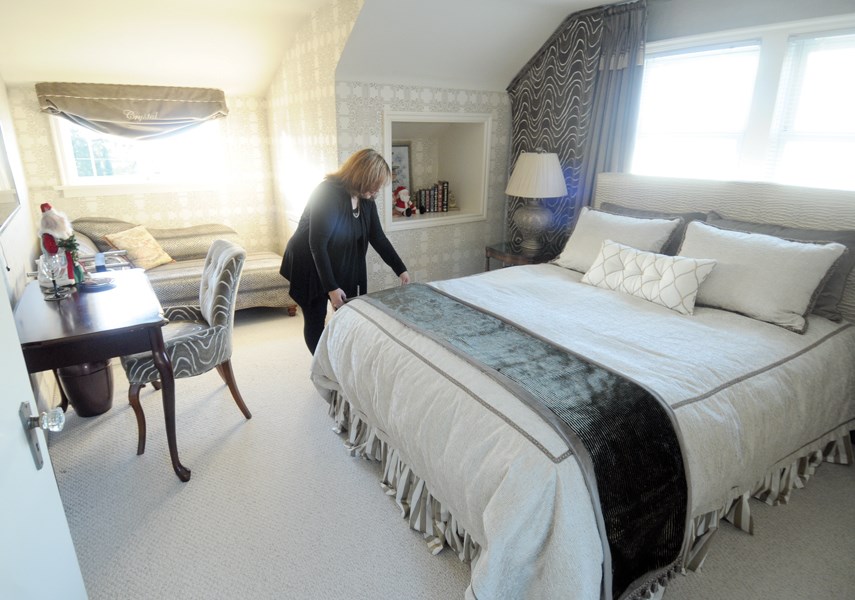A current Airbnb listing includes a garden-level suite with fireplace and “unlimited” street parking: $67 a night.
Just across the way is Crystal’s View, a traditional bed and breakfast run by Crystal Davis, a longtime proprietor struggling to compete with the proliferation of Airbnbs. “They’re taking so much business from us,” she says. “I cannot match that price.”
As a high-end operation, Davis charges between $250 and $310 per night. But it’s not just a matter of money, according to Davis. With questionable levels of quality, short-term rentals risk damaging the reputations of their tax-paying competitors as well as confusing tourists who might mistake a B&B for an Airbnb.
“Everybody should be regulated like us,” Davis says, noting that as profits dip, many of her colleagues have opted to leave the bed-and-breakfast business.
A recent review noted 666 Airbnb-type listings across the District of North Vancouver.
While the district needs to weigh the rights of property owners against the collective rights of the community, banning Airbnbs is not an option, according to Coun. Doug MacKay-Dunn.
“You can’t just say no; they tried that, I think, with marijuana. That didn’t work,” he said, speaking at a recent district workshop. “This is a runaway train . . . what we have to do is control its speed and direction.”
The district currently prohibits Airbnbs. However, municipal staff only respond to complaints, which are currently trickling in at a rate of about one per year.
The case for keeping the current system is largely based on the challenges of enforcement. With hundreds of listings spread across multiple websites and on-the-street monitoring complicated by the transitory nature of the accommodations, evidence gathering can be “time-consuming and complex,” according to a district staff report.
However, the current system allows Airbnb owners to profit without participating, countered Mayor Richard Walton.
“Airbnb is making a significant amount of money out of the North Vancouver economy and paying absolutely no tax and having no responsibility for anything here.”
The profitability of short-term rentals also jeopardizes affordable rental, Walton said.
“If people are making five times as much money with nightly Airbnbs they’re not going to make it available for students.”
A policy challenge is crafting bylaws that don’t punish homeowners who take in university students, Walton said.
The commodification of residential housing needs to be dissuaded, said Coun. Mathew Bond, who suggested the district should ensure secondary suites are reserved for long-term rentals.
With the district’s vacancy rates at a “crisis level,” even a few hundred Airbnbs become significant, noted Coun. Jim Hanson. He suggested district policy could address how many weeks per year a homeowner could rent out their principal residence.
That policy could also include location-based restrictions, Walton said, noting parking shortages in Deep Cove.
Coun. Robin Hicks called Airbnbs a “viable business,” suggesting they provide an option for tourists. However, Hicks said Airbnbs should be limited to the homeowner’s principal residence. “I think it’s equitable to the homeowner to do what they like with their property under a regulated system,” he said. “If we don’t regulate we’re implicitly supporting tax evasion.”
The provincial tax code needs to be amended, according to B.C. Hotel Association CEO James Chase.
B.C. currently has a sales tax exemption to allow operators of fewer than four rooms an exemption from collecting 10-11 per cent of provincial and municipal tax. Landlords who earn less than $30,000 are also exempt from collecting a five per cent government sales tax.
“Everyone will say I just have one room so nobody has to collect any sales tax,” Chase said.
While Airbnbs offer a less expensive experience, they also get a free ride, according to Chase, who suggested proprietors “piggy-back” on marketing done federally, provincially or locally to bring in tourists.
He was backed by the B.C. Chamber of Commerce, which issued a release arguing that rescinding those exemptions would put off-the-books landlords on the finance ministry’s radar while encouraging landlords to revert nightly rentals to monthly rentals.
The district’s miniscule vacancy rate should be the “crux of the whole discussion,” Chase said. “Many of our members are like the canary in the coal mine,” he said. “It’s hard to find employees and then we find them, and then they tell us, ‘(We) can’t find any place to live.’”
While Airbnb launched in 2008, the problem with housing employees didn’t really surface until 2015, according to Chase. By 2017, the situation was “absolutely brutal” in Penticton, Pemberton, Saanich and Victoria, Chase said. “It’s not the only element, but it is an element in the loss of long-term rental accommodation.”
Mandating Airbnb owners to buy a business licence could help the district pay for better enforcement. “Regardless of the option pursued by the district, enforcement costs are likely to escalate,” the report stated.
If continuously rented, short-term rentals can generate between two and three times more than long-term rentals, according to a report from the City of Vancouver.
The difference between B&Bs and Airbnbs is that with traditional businesses, property owners stay on the property, have a Safe Food Handling certificate and a district-issued business licence.
It’s critical short-term rentals are inspected to ensure the electrical and plumbing are all up to standard, David said.
While the sharing economy expands, safeguards need to protect older enterprises, Davis said.
The B.C. government has no policies or regulations on STRs. Short-term rentals are prohibited in the City of North Vancouver. West Vancouver does not allow for Airbnbs or conventional bed and breakfasts.



